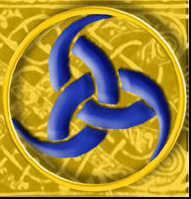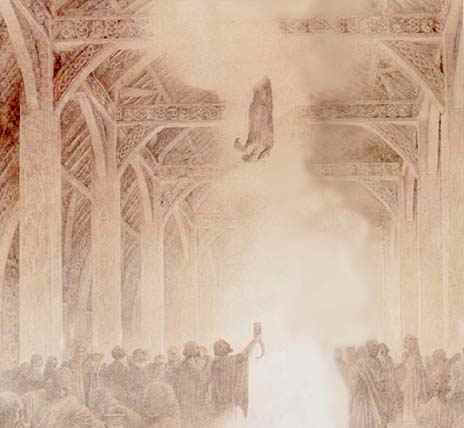
Terms of
Use
Submissions
~ Historical & Classical Poetry ~
Composed toward the end of the
first millennium, Beowulf is the classic Northern epic
of a hero's triumphs as a young warrior, killing the monster Grendel and its
mother,
and his fated death as a defender of his people.
Translation from Anglo-Saxonin alliterative verse by Francis Barton Gummere
(1855 - 1919).
Find the whole poem
here. 
Chapter 14: Beowulf has killed the monster Grendel which had wreaked havoc in
king Hrothgar´s realm.
As proof of his victory, the arm which he tore from Grendel is displayed in
Hrothgar´s hall.
XIV
HROTHGAR spake, -- to the hall he went,
stood by the steps, the steep roof saw,
garnished with gold, and Grendel's hand: --
"For the sight I see to the Sovran Ruler
be speedy thanks! A throng of sorrows
I have borne from Grendel; but God still works
wonder on wonder, the Warden-of-Glory.
It was but now that I never more
for woes that weighed on me waited help
long as I lived, when, laved in blood,
stood sword-gore-stained this stateliest house, --
widespread woe for wise men all,
who had no hope to hinder ever
foes infernal and fiendish sprites
from havoc in hall. This hero now,
by the Wielder's might, a work has done
that not all of us erst could ever do
by wile and wisdom. Lo, well can she say
whoso of women this warrior bore
among sons of men, if still she liveth,
that the God of the ages was good to her
in the birth of her bairn. Now, Beowulf, thee,
of heroes best, I shall heartily love
as mine own, my son; preserve thou ever
this kinship new: thou shalt never lack
wealth of the world that I wield as mine!
Full oft for less have I largess showered,
my precious hoard, on a punier man,
less stout in struggle. Thyself hast now
fulfilled such deeds, that thy fame shall endure
through all the ages. As ever he did,
well may the Wielder reward thee still!"
Beowulf spake, bairn of Ecgtheow: --
"This work of war most willingly
we have fought, this fight, and fearlessly dared
force of the foe. Fain, too, were I
hadst thou but seen himself, what time
the fiend in his trappings tottered to fall!
Swiftly, I thought, in strongest gripe
on his bed of death to bind him down,
that he in the hent of this hand of mine
should breathe his last: but he broke away.
Him I might not -- the Maker willed not --
hinder from flight, and firm enough hold
the life-destroyer: too sturdy was he,
the ruthless, in running! For rescue, however,
he left behind him his hand in pledge,
arm and shoulder; nor aught of help
could the cursed one thus procure at all.
None the longer liveth he, loathsome fiend,
sunk in his sins, but sorrow holds him
tightly grasped in gripe of anguish,
in baleful bonds, where bide he must,
evil outlaw, such awful doom
as the Mighty Maker shall mete him out."